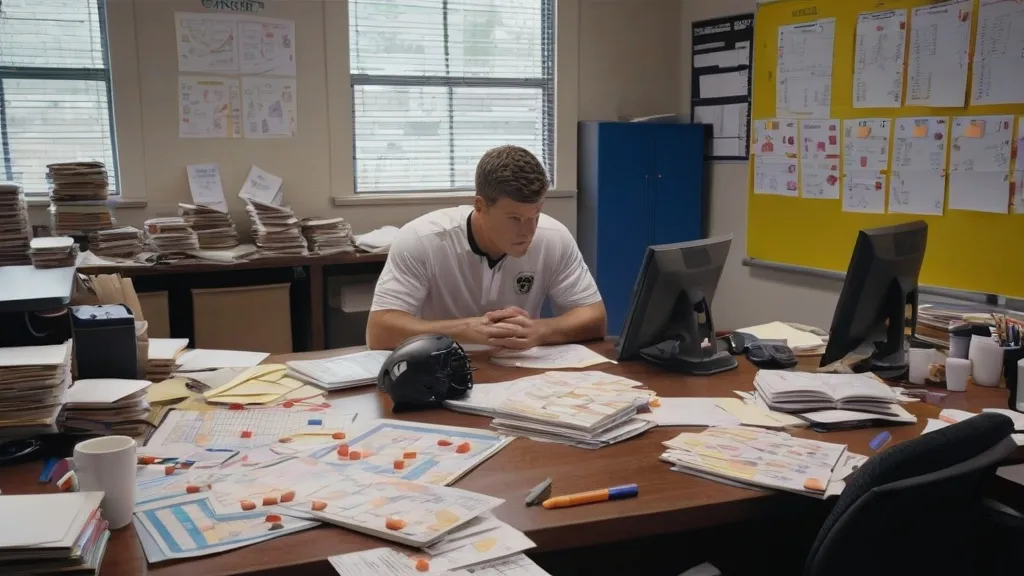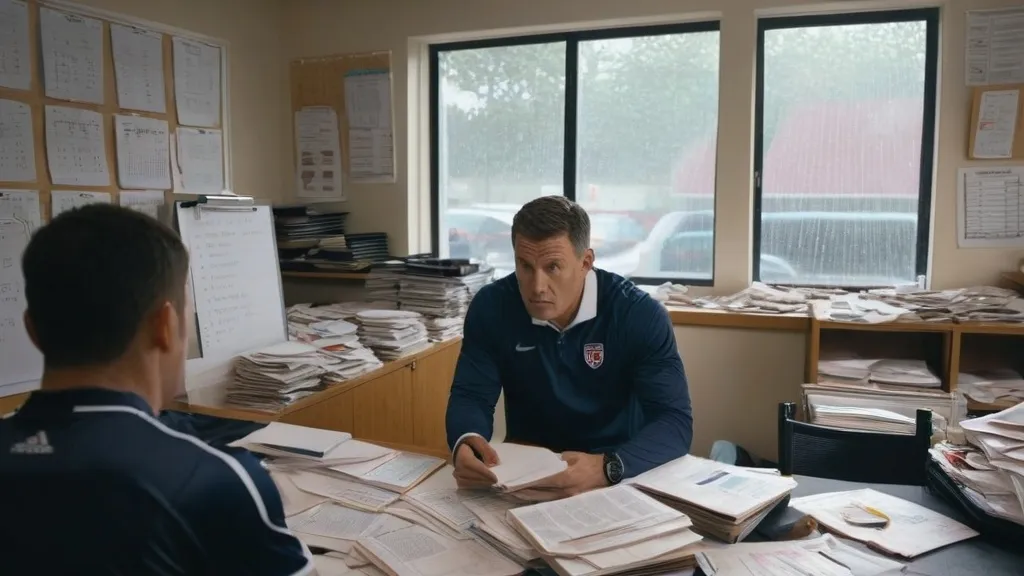Sports Management Unmasked: Chaos, Checklists, Quiet Minds

I work in sports management, which sounds fancy until you’re counting cones before sunrise. I deal with team operations, event management, sports marketing, sponsorships, ticketing, and fan engagement. On a good day, I also sleep. On a bad day, I explain what a “deliverable” is to someone who thinks it’s a pizza.
If you want a neat definition, the Wikipedia overview does a decent job. But real life is messier. It’s budgets with coffee stains. It’s athletes with feelings. It’s a coach who changes a plan at 4:59 pm and asks if “we’re good.” (We are not good.)
Why I still love and fear this job

In my experience, the people make it. The locker room. The staff who can rig a headset with duct tape and hope. The fans who show up in the rain. The small wins feel big. Even the logistics feel like a game you can win. Sometimes.
I’ve always found that performance isn’t only physical. The brain runs the show. That’s why I read a lot on sports psychology and bake those ideas into how we prepare. If a player’s mind is a blender, the best tactic won’t land. Quiet minds win games.
What I think is underrated: boring prep. Checklists. Radios that actually work. Maps for the visiting team bus so they don’t end up at a vape shop two miles away. It’s not glamorous, but neither is losing because the kit truck got lost.
I track trends like a raccoon tracks snacks, and a lot of the money talk shows up in sports business news. Media rights, NIL deals, collective bargaining, and the latest franchise valuation drama? It all hits the field eventually. You can’t set a budget if you don’t know where the river is flowing.
Day to day, my job shifts. Some days I’m in athlete management mode. Other days it’s crisis communications. I once spent three hours chasing a power outlet that would not power anything. Facilities said it was “spirit-based.” I believe them.
What I actually do (most days)
- Roster and travel: flights, buses, visas, and the “who forgot their passport” sweep.
- Game-day operations: radio channels, locker room setup, warm-up timing, refs wrangling.
- Marketing and fan engagement: social hooks, halftime bites, community events, sponsors smiling.
- Budget, contracts, compliance: invoices, insurance, risk, paperwork taller than a goalie.
- Data and sports analytics: load management, performance metrics, ticketing dashboards.
When I talk practice plans with coaches, I’ll often send them to plain-language stuff like coaching tips that don’t read like a thesis. Fresh drills, smarter reps, fewer ice baths. Mostly.
My “table-style” snapshot (simple and honest)
- Role: Team Ops | Example: Travel + Equipment | Metric: On-time arrivals, zero lost bags
- Role: Event Ops | Example: Game script + Security | Metric: No delays, no injuries
- Role: Marketing | Example: Promos + Content | Metric: Ticket sales, engagement rate
- Role: Partnerships | Example: Sponsor activations | Metric: Contract ROI, renewals
- Role: Player Care | Example: Schedules + Support | Metric: Availability, satisfaction
For money talk beyond my spreadsheets, I read Forbes SportsMoney. Follow the capital and you’ll see the next big move before your rivals do. Sometimes it’s obvious. Sometimes it’s “why did they pay that much for a logo on a sleeve.”
The calendar nobody tells you about
Off-season is not off. It’s rehab protocols, facility upgrades, scouting, sponsor renewals, and schedules that move like jelly. In-season is a sprint with paperwork. Sleep becomes a rumor.
Another “table-style” chunk (the calendar)
- Preseason: medicals, kit orders, media days, training camp
- Regular season: travel grind, game scripts, recovery blocks, press duties
- Postseason: bonus clauses, extra media, ticket surges, security layers
- Off-season: transfers, contracts, youth trials, community events
I also can’t ignore the digital side. Virtual leagues, esports, and streaming have changed the playbook. If you’re not testing virtual sports leagues, you’re missing fans who never sit in row 12 but spend big online.
The crossover is real. I’ve run activations that paired live matches with watch-party gaming. The fans loved it. If that sounds wild, read this on when sports meet gaming. It’s not a fad. It’s a pipeline.
Not every experiment lands. I once tried a “silent warm-up” activation. The DJ hated me. The players loved it. The crowd? Mixed. You try things. You measure. You keep what works and quietly bury the rest.
If policy and funding affect your club (they do), I peek at EU sport policies for youth sport, integrity, and inclusion notes. Grants, safe sport rules, cross-border events—they all snowball into your daily tasks.
Esports is not just kids yelling at screens. It’s revenue, media rights, and massive fan communities. The soccer crowd especially should track FIFA esports trends. You can partner, co-market, and recruit community leads who understand digital fandoms better than any old-school marketer.
People always ask about salaries. It varies by level and role. A rough read on pay bands sits in the BLS stats for management. Add the sports premium (or discount), weekends, long nights, and the occasional bonus for playoff runs. Don’t do it only for the money. But you should still negotiate like your rent depends on it, because it does.
Stuff that looks easy from the outside

Everyone thinks the “game script” is a cute to-do list. It’s dominoes. Anthem timing hits TV windows. Tunnel walk hits pyro cues. Halftime has three units trying to stand in the same square of turf. If one cue slips, you fix it live. Preferably with a smile and a radio no one else can hear.
Another myth: sports management is just schmoozing with athletes. That’s five percent of it. The rest is spreadsheets, scenario planning, and calls that start with “quick question” and end one hour later with a new seating map.
Tools I swear by (and those I hide from audits)
- Shared calendars with color codes (players, coaches, media, partners, facilities).
- Budget tracker with real-time updates. No mystery charges. No “oops.”
- Risk matrix: weather, travel, tech, security, medical. Simple red-yellow-green.
- Content board: season story arcs, player features, sponsor slots, community leads.
- Postgame review form: three wins, three fixes, one idea to test next time.
My early mistakes (learn from my bruises)
- I trusted verbal approvals. Now I get everything in writing. Even the “yes.”
- I overstuffed activations. Now I pick two things, run them well, and breathe.
- I skipped debriefs when we won. Wins hide problems. Problems grow.
- I ignored volunteer training. Badly prepped volunteers can sink a day fast.
- I thought “the star is fine.” The star is human. Humans tilt.
How people actually get in
- Start where the gate is open: youth clubs, college athletics, minor leagues.
- Be useful: operations, content, ticketing, or partnerships. Learn two lanes.
- Build references. Quiet ones. The kind that answer phones and vouch.
- Ship small projects: a fan survey, a better warm-up flow, a sponsor recap.
- Talk human. People hire people who can explain hard things in plain words.
I should probably say this out loud: the job is not glamorous. It’s satisfying. On the right days, it’s magic. On the wrong days, it’s a fire drill with whistles. Either way, you have to care about the work. Care about the people more.
When I say I work in sports management, I don’t mean I live in a suite. I mean I’m the person who goes home with a pocket full of zip ties and a brain full of timing marks. And yeah, I still love it. Most days.
One more “table-style” cheat sheet (skills vs results)
- Skill: Communication | Result: Fewer surprises, faster fixes
- Skill: Planning | Result: Smooth run-of-show, calmer staff
- Skill: Budgeting | Result: Projects that actually happen
- Skill: Relationship building | Result: Better deals, better days
- Skill: Recovery planning | Result: Healthier athletes, fewer late-season drops
If you want to get into sports management, start small, be steady, and watch what moves the needle. Not what looks cool on Instagram. I promise, the coolest thing is a quiet radio and a happy locker room.
FAQs
- Is the job all game days? No. Most of it is planning. Game day is showtime. You earn calm by grinding the prep.
- Do I need a degree? Helpful, sure. But experience in ops, events, or marketing can speak louder. Intern, volunteer, prove value.
- What software should I learn? Calendar tools, budget sheets, CRM, and basic data dashboards. Keep it simple. Use it daily.
- How do I handle tough coaches or players? Listen first. Set clear rules. Follow through. Respect is the currency.
- What’s one thing to do this week? Shadow an event. Take notes. After, write three fixes and send them to the lead. Be useful.

I’m Benjamin Clark, dedicated to elevating your athletic performance. Get targeted fitness plans, injury prevention techniques, sports psychology insights, and the latest in nutrition. Let’s train smarter.



Sports management seems like a non-stop whirlwind of chaos and checklists, but the quiet minds definitely win games!
Do you struggle more with the chaos or the checklists in sports management?